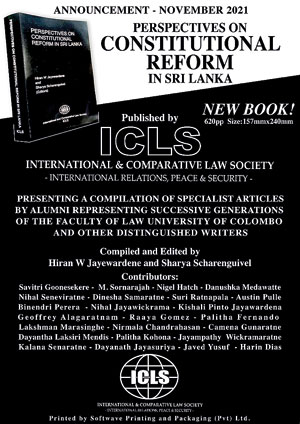Sunday Times 2
Lanka’s lost opportunities in enacting a constitution that transcends personalities and short-term political gains
‘Perspectives on Constitutional Reform in Sri Lanka’ edited by Dr. Hiran.W. Jayewardene and Prof. Sharya Scharenguivel is published by the International and Comparative Law Society at a crucial time in the life of the nation. It is unveiled at a time when the Government prepares to introduce a new constitution, much of the contents of which is unknown to the public at large. Reading the essays, one cannot help but note of the opportunities that Sri Lanka lost over the years to introduce an enduring constitution that transcends personalities and short-term political gain.

Book facts: Perspectives on Constitutional Reform in Sri Lanka’ edited by Dr. Hiran.W. Jayewardene and Prof. Sharya Scharenguivel Published by the International and Comparative Law Society
The compilation of essays contains writings of a range of distinguished academics including Prof. Savithri Goonesekere, Prof. M. Sornarajah, Prof. Nihal Jayawickrama, Prof. Suri Ratnapala and Prof. Lakshman Marasinghe. The perspectives of the practitioners and professionals on the judiciary and constitutional reform are found in a range of writings. The inaugural Sir Ivor Jennings Memorial Oration by Prof. Goonesekere on ‘Constitutionalism, Governance and the People’ speaks of “the abiding human values that are universal and represent lived experience on human wellbeing and accountability in the exercise of power.”
In the section on ‘The Evolution of Constitution Making’, Nigel Hatch PC sets out the historical outline of constitution making and development. A collection of essays under the theme ‘Conceptual Approaches, Change, Successive Attempts and Alternatives’ sets out the trajectory of successive attempts at constitutional reform.
An entire chapter of essays is dedicated to the Role of the Judiciary in Sri Lanka whilst other chapters are devoted to the Devolution of Power; Human Rights and International Treaties.
Espousing the cause for establishing a Constitutional Court is Prof. Nihal Jayawickrama who muses whether “the Supreme Court, as at present constituted, is indeed the appropriate forum to determine serious issues of constitutional law.” Raaya Gomez writes on the Opportunities and Challenges of a Constitutional Court for Sri Lanka in the Asian Context.
Prof. Jayawickrama writes on six core judicial values, the most important being independence and the other five being Impartiality, Personal Integrity, Propriety, Equality and Competence/Diligence. He emphasises on the need of an independent appointment mechanism to the judiciary where the intervention of the Head of State is only a formality.
Geoffrey Alagaratnam PC, former President of the Bar Association of Sri Lanka presents, from a practitioner’s perspective, Ideas for Reform on ensuring the independence of the judiciary in Sri Lanka. He calls for judicial accountability notwithstanding its independence, questioning “otherwise who will guard the guards?” He sees a strong and independent bar being a “sine qua non if the judiciary is to be protected against pressures subtle or otherwise that undermine their independence.”
Kishali Pinto Jayawardena , Journalist, lawyer, and pioneer member of the Right to Information Commission, discusses the case of the Indian lawyer Prashant Bhushan, making the case for reform of the Contempt of Court Law in Sri Lanka, framed within a new rights narrative. She calls upon the due process clause to apply to contempt proceedings, stressing on the need for public scrutiny of the judicial institutions to be of paramount importance. She argues that emerging issues involving free speech in the age of modern technology; restrictions on liberty; truth as defence; intent to interfere with the course of justice should be part of this debate on contempt of court jurisprudence.
Dr. Jayampathy Wickremeratne PC writes on Strengthening Parliament – the 19th Amendment and Beyond, written at a time he may not have envisaged the fate of the 19th Amendment and the weakening of Parliament with the demise of the 19th Amendment. Dr. Kalana Senaratne in his ‘The Road to the 20th Amendment’ sees that as a way that re-creates an Imperial President but defends it as an ‘unfortunate outcome of the unfortunate legacy of the Yahapalana government’. Probably written at a time before the full impact of Covid-19 and the economic impact of many actions were felt, Dr. Senaratne sees the 20th Amendment as being a “product of the deep desire of people to have an efficient government”.
Dr. Dayanath Jayasuriya PC, in his article argues that given that neither the Supreme Court nor the Attorney General has any control over Committee Stage Amendments, that the Supreme Court erred in its final interpretation that with suitable amendments to the Bill that the 20th amendment will not violate the Constitutional Provisions and will not require a referendum.
The last of the essays is on ‘Sir James Peiris: Visionary Leader of Constitutional Reform in Ceylon’, emphasising on the Memorandum on the Reform of the Legislative Council of 1908 and the manner in which he appealed to the liberal elite to introduce the elective principle which was a milestone on the path to representative self-government.
A number of essays reflect on the failure of Constitutional Reform in Sri Lanka. Whilst Danushka Medawatte writes inter alia of ‘a Still Birth of Constitutional Reforms’; Suri Ratnapala sees ‘ A nation stalled at the Crossroads: Sri Lanka’s Perpetually Endangered Constitutional Order.’ Dinesha Samararatne writes on ‘Transformative Constitutionalism’ from South Africa to Sri Lanka.
The Preface to the Book by the Trustees of the ICLS reflects that “the hallmark of a good constitution is that there will be transparency and opportunity for reflection and debate and that the Constitution will reflect the concerns of our multi-ethnic, multilingual and multi-religious society.” As Sri Lanka is once again at the crossroads one can only hope that the wisdom and sanity reflected in many of the essays will be taken into account by those involved in the process of constitutional making and that any new constitution that will be finally enacted will be an outcome of a truly inclusive and consultative process.
(Saliya Pieris, PC is the president of the Bar Association of Sri Lanka)

